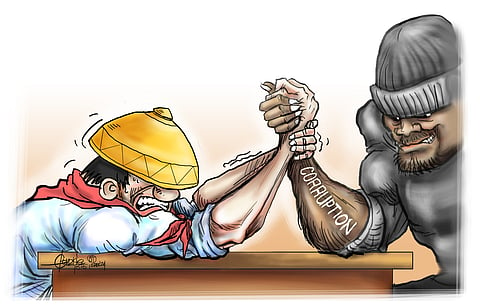
- NEWS
- the EDIT
- COMMENTARY
- BUSINESS
- LIFE
- SHOW
- ACTION
- GLOBAL GOALS
- SNAPS
- DYARYO TIRADA
- MORE

As the Philippines marked International Anti-Corruption Day last Monday, 9 December, the perennial issue of corruption remains one of the most formidable challenges in our nation’s journey toward equitable development and economic prosperity.
While various administrations have come and gone with promises to root out corruption, the sobering reality remains: Around 20 million Filipinos continue to live below the poverty line. This glaring disconnect between the fight against corruption and the lived experience of poverty raises questions about the effectiveness of current efforts and the systemic changes needed to end this scourge.
Corruption and poverty are deeply intertwined. Misuse of public funds, favoritism in resource allocation, and bribery siphon away resources that could otherwise be used to uplift marginalized communities.
Essential services like healthcare, education and infrastructure development often bear the brunt of this malpractice, disproportionately affecting the poor. For instance, a corrupt official pocketing funds meant for a rural health center directly translates into inaccessible medical services for low-income families.
The Philippines is no stranger to high-profile corruption cases, from the pork barrel scam to anomalies in pandemic response funds. Each scandal not only erodes public trust but also underscores how institutional weaknesses enable the continued exploitation of public resources.
Meanwhile, millions of Filipinos remain trapped in a cycle of poverty, unable to access opportunities for upward mobility due to the systemic misallocation of resources.
Efforts to combat corruption have yielded mixed results. The establishment of institutions like the Office of the Ombudsman and the Commission on Audit (CoA) reflects a commitment to accountability. High-profile convictions, such as those of corrupt officials, serve as reminders that the rule of law still applies. However, the persistence of poverty suggests that these victories are not enough.
One of the key obstacles is the deeply ingrained culture of patronage and impunity. In many instances, whistleblowers face retaliation, and those in power often manipulate the justice system to evade accountability. The result is a vicious cycle where corruption remains unchecked, and resources fail to trickle down to the most vulnerable sectors of society.
To bridge the gap between anti-corruption efforts and tangible improvements in people’s lives, systemic reforms are imperative. This includes not only strengthening institutions but ensuring that recovered funds are transparently redirected to programs that directly address poverty.
For instance, public housing projects, scholarships for underprivileged students, and livelihood programs can create a more visible impact, thereby restoring faith in governance.
Ending corruption is a daunting but not an impossible task. It requires various approaches.
Independent oversight bodies like the CoA and the Ombudsman must be adequately funded and empowered to act without political interference. Regular audits, transparency in procurement processes, and robust mechanisms for citizen complaints are crucial.
An informed and vigilant populace is a powerful deterrent to corruption. Grassroots movements, public watchdogs, and media reporting play a vital role in exposing wrongdoing. Civic education should emphasize the importance of integrity and accountability.
Digital governance minimizes human discretion, thereby reducing opportunities for corruption. Initiatives such as e-governance and digital payment systems can help ensure transparency in public transactions.
A justice system that swiftly and fairly penalizes corrupt officials sends a strong message. Laws must be revisited to ensure that penalties are proportionate to the harm caused, and the protection of whistleblowers should be prioritized.
Public officials should undergo ethics training, and political parties must be held accountable for the integrity of their candidates. A leadership that leads by example fosters a culture of honesty and public service.
As a whole, the battle against corruption is as much a moral struggle as it is a political one. It requires not only institutional reforms but also a cultural shift toward valuing transparency, accountability, and service over self-interest.
As we reflect on International Anti-Corruption Day, let it serve as a reminder that the fight against corruption is far from over. It is a fight that must be waged relentlessly — for the sake of the millions of Filipinos who continue to dream of a better life and for the future of a nation that deserves nothing less than integrity in governance.
